

Calculus BetterExplained. Practical Ethics. About the Course.
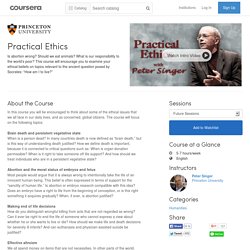
DQ 101: Introduction to Decision Quality. Uncertainty and endless debate can inhibit our ability to make good decisions.
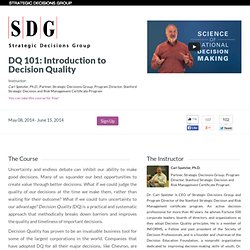
Many of us squander our best opportunities to create value through better decisions. What if we could judge the quality of our decisions at the time we make them, rather than waiting for their outcome? What if we could turn uncertainty to our advantage? Decision Quality (DQ) is a practical and systematic approach that methodically breaks down barriers and improves the quality and timeliness of important decisions. Decision Quality has proven to be an invaluable business tool for some of the largest corporations in the world. How to Reason and Argue. Critical Thinking. Course Summary This MOOC is an introduction in Critical Thinking, with an emphasis on using reason in our daily communication.
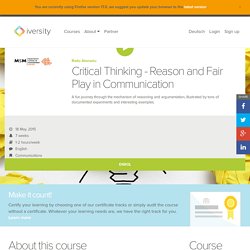
Its main topics cover the structure and analysis of arguments, the study of inductive reasoning as basis for scientific knowledge and as key ingredient in how we understand reality. Next we will focus on fallacies (like loaded question or hasty generalization) and on guidelines for structuring a presentation, an argumentative essay or a debate. Furthermore, the course gives you an overview of cognitive biases (a fashionable topic nowadays), and on the use of emotional tools in persuasion. The teaching is accompanied by tons of documented experiments and fun examples, guided practice, quizzes, links to additional materials (like TED talks) and short homework. Mathematical Philosophy. Introduction to Mathematical Thinking. About the Course NOTE: For the Fall 2015 session, the course website will go live at 10:00 AM US-PST on Saturday September 19, two days before the course begins, so you have time to familiarize yourself with the website structure, watch some short introductory videos, and look at some preliminary material.
The goal of the course is to help you develop a valuable mental ability – a powerful way of thinking that our ancestors have developed over three thousand years. Mathematical thinking is not the same as doing mathematics – at least not as mathematics is typically presented in our school system. School math typically focuses on learning procedures to solve highly stereotyped problems. Professional mathematicians think a certain way to solve real problems, problems that can arise from the everyday world, or from science, or from within mathematics itself.
The course is offered in two versions. Logic 101. Logic 101 These lectures cover introductory sentential logic, a method used to draw inferences based off of an argument's premises.
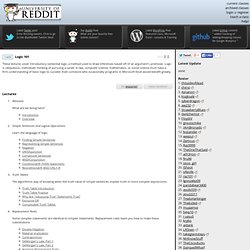
Logic is ubiquitous--individuals thinking of pursuing a career in law, computer science, mathematics, or social science must have a firm understanding of basic logic to succeed. Even someone who occasionally programs in Microsoft Excel would benefit greatly. Lectures Prerequisites Logic 101 is the ground floor--there are no prerequisites other than being willing to think through problems. Syllabus. Logic: Language and Information 1. About the Course Information is everywhere: in our words and our world, our thoughts and our theories, our devices and our databases.
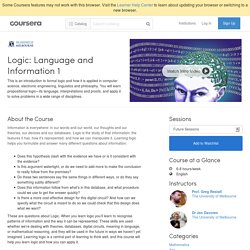
Logic is the study of that information: the features it has, how it’s represented, and how we can manipulate it. Learning logic helps you formulate and answer many different questions about information: Does this hypothesis clash with the evidence we have or is it consistent with the evidence? Is this argument watertight, or do we need to add more to make the conclusion to really follow from the premises? Learning How to Learn. Creative Problem Solving. About the Course This course will help you understand the role of creativity, innovation, and problem solving in your own life and across disciplines.
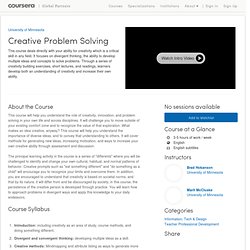
It will challenge you to move outside of your existing comfort zone and to recognize the value of that exploration. What makes an idea creative, anyway? This course will help you understand the importance of diverse ideas, and to convey that understanding to others. Introduction to Psychology. Syllabus Professor Paul Bloom, Brooks and Suzanne Ragen Professor of Psychology Description What do your dreams mean?
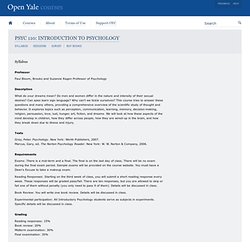
Applied Cryptography and Encryption. When does the course begin?
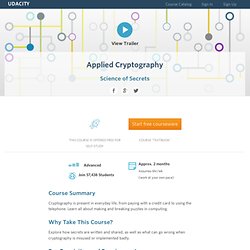
This class is self paced. You can begin whenever you like and then follow your own pace. Quantum Mechanics & Computation. AI: Neural Networks. About the Course Neural networks use learning algorithms that are inspired by our understanding of how the brain learns, but they are evaluated by how well they work for practical applications such as speech recognition, object recognition, image retrieval and the ability to recommend products that a user will like.
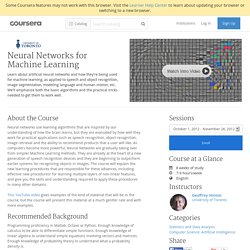
As computers become more powerful, Neural Networks are gradually taking over from simpler Machine Learning methods. They are already at the heart of a new generation of speech recognition devices and they are beginning to outperform earlier systems for recognizing objects in images. The course will explain the new learning procedures that are responsible for these advances, including effective new proceduresr for learning multiple layers of non-linear features, and give you the skills and understanding required to apply these procedures in many other domains. Recommended Background Programming proficiency in Matlab, Octave or Python. Computational Neuroscience. About the Course This course provides an introduction to basic computational methods for understanding what nervous systems do and for determining how they function.
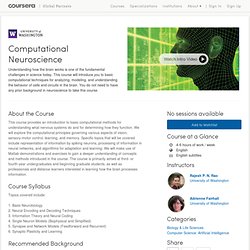
We will explore the computational principles governing various aspects of vision, sensory-motor control, learning, and memory.